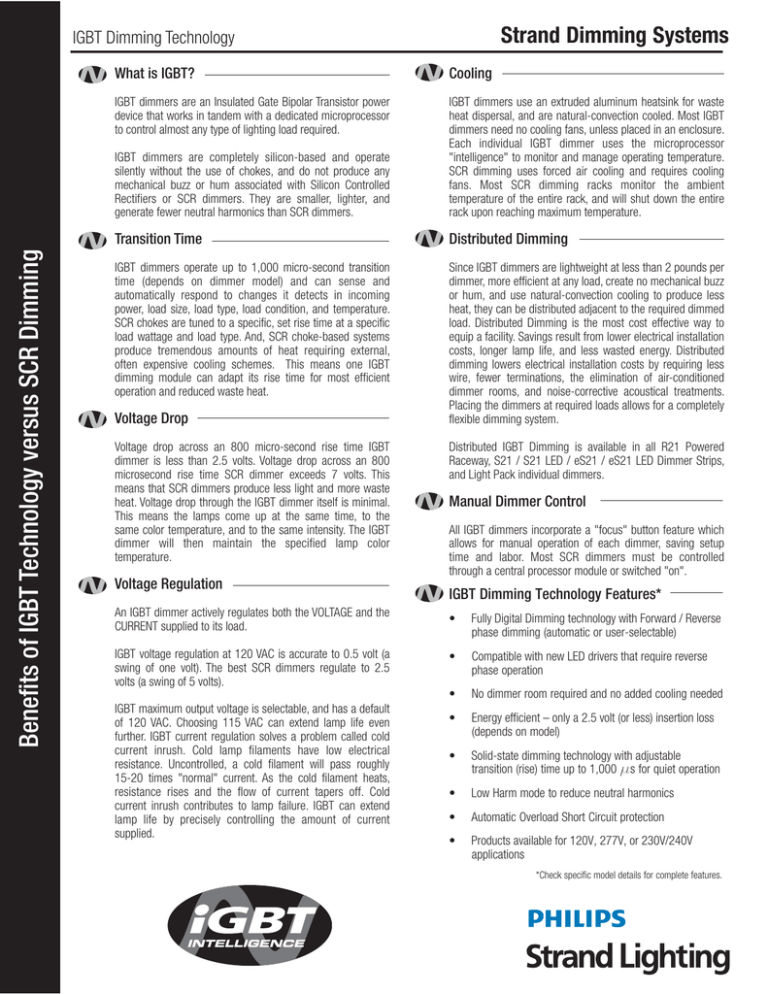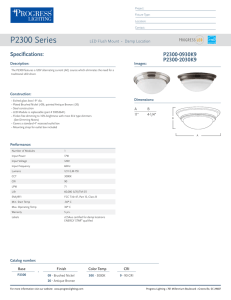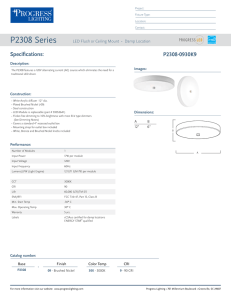
Strand Dimming Systems
Benefits of IGBT Technology versus SCR Dimming
IGBT Dimming Technology
What is IGBT?
Cooling
IGBT dimmers are an Insulated Gate Bipolar Transistor power
device that works in tandem with a dedicated microprocessor
to control almost any type of lighting load required.
IGBT dimmers are completely silicon-based and operate
silently without the use of chokes, and do not produce any
mechanical buzz or hum associated with Silicon Controlled
Rectifiers or SCR dimmers. They are smaller, lighter, and
generate fewer neutral harmonics than SCR dimmers.
IGBT dimmers use an extruded aluminum heatsink for waste
heat dispersal, and are natural-convection cooled. Most IGBT
dimmers need no cooling fans, unless placed in an enclosure.
Each individual IGBT dimmer uses the microprocessor
"intelligence" to monitor and manage operating temperature.
SCR dimming uses forced air cooling and requires cooling
fans. Most SCR dimming racks monitor the ambient
temperature of the entire rack, and will shut down the entire
rack upon reaching maximum temperature.
Transition Time
Distributed Dimming
IGBT dimmers operate up to 1,000 micro-second transition
time (depends on dimmer model) and can sense and
automatically respond to changes it detects in incoming
power, load size, load type, load condition, and temperature.
SCR chokes are tuned to a specific, set rise time at a specific
load wattage and load type. And, SCR choke-based systems
produce tremendous amounts of heat requiring external,
often expensive cooling schemes. This means one IGBT
dimming module can adapt its rise time for most efficient
operation and reduced waste heat.
Since IGBT dimmers are lightweight at less than 2 pounds per
dimmer, more efficient at any load, create no mechanical buzz
or hum, and use natural-convection cooling to produce less
heat, they can be distributed adjacent to the required dimmed
load. Distributed Dimming is the most cost effective way to
equip a facility. Savings result from lower electrical installation
costs, longer lamp life, and less wasted energy. Distributed
dimming lowers electrical installation costs by requiring less
wire, fewer terminations, the elimination of air-conditioned
dimmer rooms, and noise-corrective acoustical treatments.
Placing the dimmers at required loads allows for a completely
flexible dimming system.
Voltage Drop
Voltage drop across an 800 micro-second rise time IGBT
dimmer is less than 2.5 volts. Voltage drop across an 800
microsecond rise time SCR dimmer exceeds 7 volts. This
means that SCR dimmers produce less light and more waste
heat. Voltage drop through the IGBT dimmer itself is minimal.
This means the lamps come up at the same time, to the
same color temperature, and to the same intensity. The IGBT
dimmer will then maintain the specified lamp color
temperature.
Voltage Regulation
Distributed IGBT Dimming is available in all R21 Powered
Raceway, S21 / S21 LED / eS21 / eS21 LED Dimmer Strips,
and Light Pack individual dimmers.
Manual Dimmer Control
All IGBT dimmers incorporate a "focus" button feature which
allows for manual operation of each dimmer, saving setup
time and labor. Most SCR dimmers must be controlled
through a central processor module or switched "on".
IGBT Dimming Technology Features*
An IGBT dimmer actively regulates both the VOLTAGE and the
CURRENT supplied to its load.
•
Fully Digital Dimming technology with Forward / Reverse
phase dimming (automatic or user-selectable)
IGBT voltage regulation at 120 VAC is accurate to 0.5 volt (a
swing of one volt). The best SCR dimmers regulate to 2.5
volts (a swing of 5 volts).
•
Compatible with new LED drivers that require reverse
phase operation
•
No dimmer room required and no added cooling needed
•
Energy efficient – only a 2.5 volt (or less) insertion loss
(depends on model)
•
Solid-state dimming technology with adjustable
transition (rise) time up to 1,000 ms for quiet operation
•
Low Harm mode to reduce neutral harmonics
•
Automatic Overload Short Circuit protection
•
Products available for 120V, 277V, or 230V/240V
applications
IGBT maximum output voltage is selectable, and has a default
of 120 VAC. Choosing 115 VAC can extend lamp life even
further. IGBT current regulation solves a problem called cold
current inrush. Cold lamp filaments have low electrical
resistance. Uncontrolled, a cold filament will pass roughly
15-20 times "normal" current. As the cold filament heats,
resistance rises and the flow of current tapers off. Cold
current inrush contributes to lamp failure. IGBT can extend
lamp life by precisely controlling the amount of current
supplied.
*Check specific model details for complete features.
Strand Dimming Systems
IGBT Dimming Technology
Neutral Harmonics
All phase control dimming systems generate harmonic currents. Excess harmonic currents can overload neutral conductors and overheat
service transformers. Excess harmonic currents also manifest themselves as noise. IGBT dimming features a patented LOW HARM
operating mode that limits harmonic currents and reduces the noise produced by the dimming system.
Benefits of IGBT Technology versus SCR Dimming
IGBT Versus SCR Benefits
Quiet
Efficient
Size/Weight
No RF Noise
Affordable
SCR
Forward versus Reverse Phase Control
Below is a graphical representation of Forward and the benefits of Reverse Phase Control.
Reverse Phase Control
Forward Phase Control
FORWARD PHASE CONTROL (turns current on)
REVERSE PHASE CONTROL (turns current off)
Transition Time
Transition Time
Sudden rise causes
filament oscillation
Smooth rise minimizes
filament oscillation
Philips Strand Lighting
Dallas
10911 Petal Street
Dallas, TX 75238
Tel: (214) 647-7880
Fax: (214) 647-8030
New York
267 5th Ave, 4th Floor
New York, NY 10016
Tel: (212) 213-8219
Fax: (212) 532-2593
Auckland
19-21 Kawana Street
Northcote, Auckland 0627
New Zealand
Tel: + 64 9 481 0100
Fax: + 64 9 481 0101
Asia
Unit C, 14/F
Roxy Industrial Centre
No. 41-49 Kwai Cheong Road
Kwai Chung, N.T., Hong Kong
Tel: +852 2796 9786
Fax: +852 2798 6545
120911NA_EUA
www.strandlighting.com
© Philips Group 2011
All rights reserved.
The Company reserves the right
to make any variation in design or
construction to the equipment
described. E&OE
Europe
European Service & Distribution Centre
Marssteden 152
Enschede 7547 TD
the Netherlands
Tel: +31-53-4500424
Fax: +31-53-4500425


